
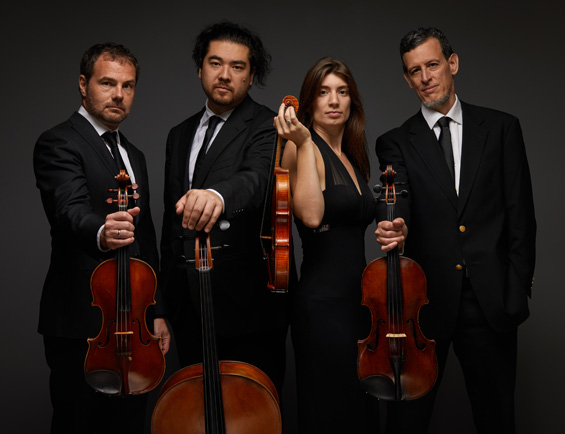
photo: Euclid Quartet (l-r: Jameson Cooper, Justin Goldsmith, Aviva Hakanoglu, Luis Enrique Vargas)
FIVE QUESTIONS WITH EUCLID QUARTET
On its first three albums, Euclid Quartet concentrated on one composer at a time, Hugo Kauder on the group's debut (Centaur Records, 2007) and Béla Bartók on the two Artek volumes issued in 2010 and 2013. The number expanded to two for 2017's American Quartets: Antonín Dvorák & Wynton Marsalis, and now, with the just-issued Breve, violinists Jameson Cooper and Aviva Hakanoglu, violist Luis Enrique Vargas, and cellist Justin Goldsmith have changed things up dramatically in releasing a collection of short single-movement works featuring no less than eleven composers. Breve (reviewed here) arrives more than a quarter-century after the group's 1998 formation in Ohio and seventeen after it was appointed to the string quartet residency at Indiana University South Bend, where its members teach private lessons and coach chamber music. Over the years, the group's membership has changed, but the exceptionally high calibre of its music-making has remained firmly in place. The quartet never fails to impress, whether it's performing on the concert stage or visiting a school classroom, and its efforts have been repeatedly recognized with acclaim and awards. Coinciding with the release of Breve, Vargas and Goldsmith spoke with textura to discuss the new release, the group's background, and its individual members.
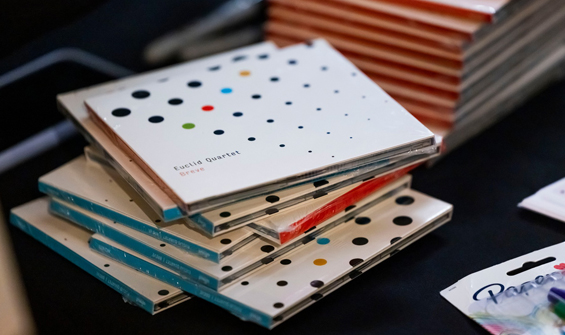
photo: Euclid Quartet
1. I love the concept behind Breve, that instead of presenting two or three long-form works on an album you present shortpieces that have little in common aside from brevity. From where did the concept for the project originate? And once you decided on the concept, how difficult was it to reduce the list to the eleven pieces on the release?
(Luis Enrique Vargas) The idea of making a recording of short works has been on our minds for quite some time, several years, really; in fact, there have been several membership changes since we first thought of it. This idea was to depart from the usual string quartet recording, which usually features two (maybe three, depending on size) full works with several movements. Other common quartet recordings out there (and in our own catalogue) are made up of works by a single composer (such as our whole Bartók cycle).
The concept we explored on Breve gives us a lot of room and liberty to choose different styles, periods, and character pieces that are no longer than nine minutes and that you could shuffle around as you listen to get a different experience every time (not something you would do with other recordings). We also wanted to feature on a recording some of our favourite short works that have spanned the life of the quartet and that have been part of our repertoire. When we discussed what we would put on it, we compiled a list, which is still on a white board in our quartet studio. Then COVID caused havoc and more personnel changes happened, so we decided to put it aside for a while. We finally decided to pursue this project when the opportunity arose to apply for an internal grant through Indiana University, specifically, the Presidential Arts and Humanities Production Grant, which we could apply for as faculty. We were thrilled that we were awarded the grant and were able to cover the post-production expenses and our dream came true!
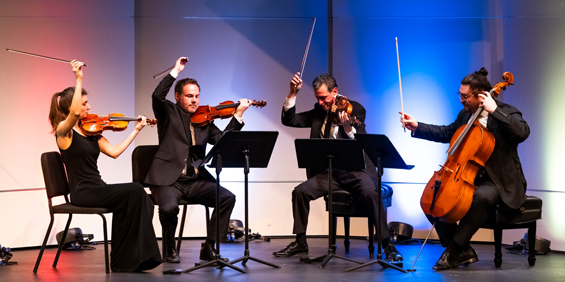
photo: Euclid Quartet
2. While the group is naturally fond of all of the pieces on Breve, are there some that you particularly favour, either as compositions or for how they go over with audiences? And are there any that are especially challenging to play?
(Justin Goldsmith) It's an interesting process to put together a project like this as a quartet when each member has very different feelings about each piece! There are a few on the album that we all love, then there are others that some of us love and others tolerate. But it's our job to make sure that we're playing all of these pieces with the energy and attention to detail that they deserve, regardless of personal bias; in the end, it's about the composer's voice and the quartet's voice more than our own. For me, I feel a bit of overlap between categories. A few of my favourites on the album are some of the hardest to put together; off the top of my head, I have a strong affinity for the Schubert, Turina, and Wolf pieces, but they are all very difficult!
3. The range of material you perform is huge, but are there particular periods and/or composers that you're especially drawn to? (It's challenging to make any determination in that regard from listening to Breve as all of the pieces are performed with equal degrees of affection and conviction.)
(Goldsmith) That is something I (and I think my colleagues) take as a big compliment, so thank you! Each of us has specific interests in terms of repertoire. The goal of Euclid Quartet is not necessarily to move on from the old standards—we all love Beethoven and Haydn—but we end up playing a pretty wide variety of music simply because we each bring new stuff to the table. For example, Aviva has introduced us to new repertoire by composers of historically disadvantaged backgrounds, particularly female composers. Luis has brought in some pieces by Latinx composers. Personally I'm drawn to (and advocate for, in our repertoire discussions) particular musical languages from the twentieth century and Haydn.
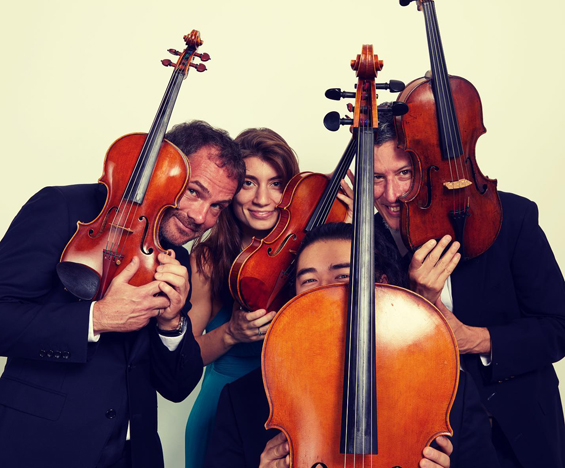
photo: Euclid Quartet
4. Euclid Quartet formed in 1998, but not all of you have been with the group since the start. Please clarify when each of you formally joined the group. You've also been Quartet-in-Residence at Indiana University South Bend for seventeen years. In what ways has this arrangement influenced the group's development?
(Vargas) Out of the four of us, Jamie is the only remaining founding member since the group's start as a graduate student quartet at Kent State University. I joined the group when they were leaving Kent and had been offered the quartet's first position in Sioux City, Iowa; in fact, my audition for the quartet took place at Kent State University in 2001. Aviva joined the quartet in 2021 and Justin in 2022. The quartet became the faculty resident quartet at Indiana University South Bend in 2007, a residency that has been in place for fifty years.
I can safely say that having a home base has done some great things for us, not only on the educational side but also in providing us with a place to perform and record. Two of our five recording have been recorded at our school (the Dvorak-and-Marsalis set and Breve). In addition to our performances on campus we have expanded our scope to include a lot of informal classroom performances in the form of outreach to children in our local schools and have taken our performances out into the community, thanks to this partnership with our university and with local institutions such as the Fischoff Chamber Music organization, the South Bend Public Library, the South Bend Symphony Orchestra, the Civil Rights Heritage Center, and other unusual venues. Obviously, this is just what goes on in our immediate area, but we are busy on the road as well!
5. As each of you brings a different background to the group—Jameson, for example, was born in Sheffield, England and played in the National Youth Chamber Orchestra, whereas Luis is Venezuela-born and was a member of the Venezuelan Youth Orchestra's “El Sistema” program—I'm curious as to what impact those differences have had on the development of Euclid Quartet's sound and identity?
(Vargas) I do believe that each of the members, past and present, has brought something important to our “mini melting pot.” We had such different backgrounds, education, upbringings, experiences, and have lived quite remarkably different lives before becoming a part of Euclid Quartet. I like the idea that both sound and identity are part of the same thing. With that in mind, I like to think that our basic “sound identity” came as a result of our meticulous learning of tough works early on. One that comes to mind is Bartók's fourth quartet, for which we had to learn different set of skills; for example, in order to bring out the intricacies of the score we had to consider, among many other things, how to use our bows in a way that would bring to life all the work's hidden treasures.
We are lucky that with so many membership changes, somehow our “sound identity” has remained almost intact. Perhaps we were, either consciously or unconsciously, always on the lookout for those qualities. I think we've developed a style of playing that we like very much and which gives articulation strong consideration. That has helped us expand our colour palette and achieve better treatment of thematic material, in terms of balance, as well as setting a strong backbone to help with our ensemble.
More on the question of the different backgrounds of our members, we have brought to the group particular interests in repertoire from our former experiences. I, for instance, introduced the group to pieces by Latin American composers that we recorded for the album, such as Metro Chabacano and Four For Tango; Aviva has introduced us and has encouraged us to include works by female composers, Justin has a special interest in the quartets by Britten, and we are currently learning the composer's first string quartet for an upcoming performance.
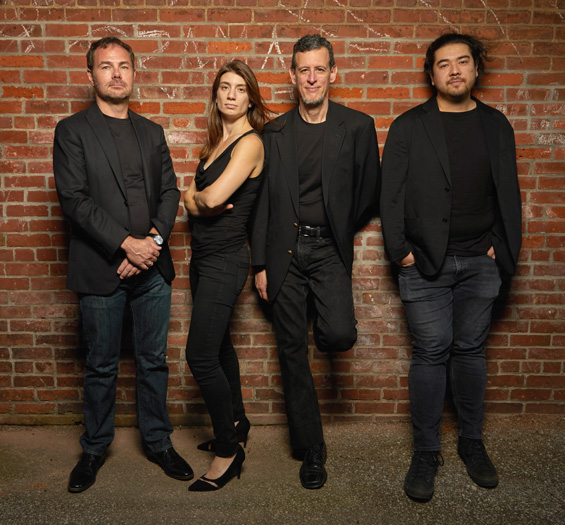
photo: Euclid Quartet
Bonus question: Odd-numbered ensembles have an advantage when it comes to vote-casting. How do you go about making group decisions when two want one thing and the other two want another?
(Goldsmith) In my experience, any group of human beings will have disagreements. We tend to get into situations where our positions are not so entrenched. I'm not sure if the rest of my colleagues use these terms, but I'm constantly asking myself, “Do I want to die on this hill?” If the answer is no, then my position is malleable, and we have discussions. We're all reasonable people who are able to understand each other's arguments and make decisions based on many factors. I've found that, in my relatively short time since joining the quartet, we rarely end up doing a vote-casting process. Our decision-making process (in terms of both musical and business decisions) feels more like sharing our individual perspectives, understanding them, and coming to what seems to be the best solution for all involved.
website: EUCLID QUARTET
February 2024![]()